
Tamale, Aug. 17, GNA - The Ghana Commercial Agriculture Project (GCAP) has put in place a mechanism to resolve grievances that may arise as a result of the implementation of its projects.
The mechanism seeks to provide its Grievance Redress Committee (GRC) members and investors both at the zonal and community levels with knowledge and skills in receiving, addressing and resolving grievances from affected persons promptly.
It made the statement on Wednesday during a three-day training on the Alternative Dispute Resolution (ADR) for the GRC and other stakeholders in Tamale.
The purpose of the training was to equip the GRC with the knowledge and skills on how to work together to resolve disputes within the Nasia-Nabogu Inland Valley (NNIV) in the West Mamprusi District.
It was also to ensure that land owners and investor interests are protected in all land transactions.
Mr Bloomfield Attipoe, Zonal Coordinator of GCAP, called on stakeholders to work closely to ensure that all concerns in their operational areas were addressed.
He said the GCAP was established by the government of Ghana under the auspices of the Ministry of Food and Agriculture with support from the World Bank and USAID and it seeks to help remove binding constraints to commercial agriculture in the country with a special focus on rice, maize and soya.
He said the role of the GCAP was also to facilitate investments in commercial agriculture in the Accra Plains and in the SADA Ecological Zone.
Mr Attipoe said GCAP has supported a total of 22 investors in SADA Zone in the year 2014 to remove their binding constraints so that they could free resources to support more out-growers.
He said the project has also provided support in land development, construction of warehouses, irrigation and training among others.
'In 2016 the project supported a number of selected investors with facilities such as water retention structures, bonding and improved land development to enable them cultivate rice under an improved rain-fed farming system aimed at increasing rice cultivation in the Nasia-Nabogo valley', he said
GNA
By Caesar Abagali, GNA




 SSNIT must be managed without gov’t interference – Austin Gamey
SSNIT must be managed without gov’t interference – Austin Gamey
 Ejisu by-election could go either way between NPP and independent candidate — Gl...
Ejisu by-election could go either way between NPP and independent candidate — Gl...
 We never asked ministers, DCEs to bring NPP apparatchiks for returning officer r...
We never asked ministers, DCEs to bring NPP apparatchiks for returning officer r...
 No one denigrated the commission when you appointed NDC sympathizers during your...
No one denigrated the commission when you appointed NDC sympathizers during your...
 Used cloth dealers protests over delayed Kumasi Central Market project
Used cloth dealers protests over delayed Kumasi Central Market project
 A/R: Kwadaso onion market traders refuse to relocate to new site
A/R: Kwadaso onion market traders refuse to relocate to new site
 Dumsor: Corn mill operators at Kaneshie market face financial crisis
Dumsor: Corn mill operators at Kaneshie market face financial crisis
 Jamestown fishermen seek support over destruction of canoes by Tuesday's heavy d...
Jamestown fishermen seek support over destruction of canoes by Tuesday's heavy d...
 Election 2024: EC to commence voter registration exercise on May 7
Election 2024: EC to commence voter registration exercise on May 7
 Public schools rebranding: We’re switching to blue and white, we’re painting all...
Public schools rebranding: We’re switching to blue and white, we’re painting all...
